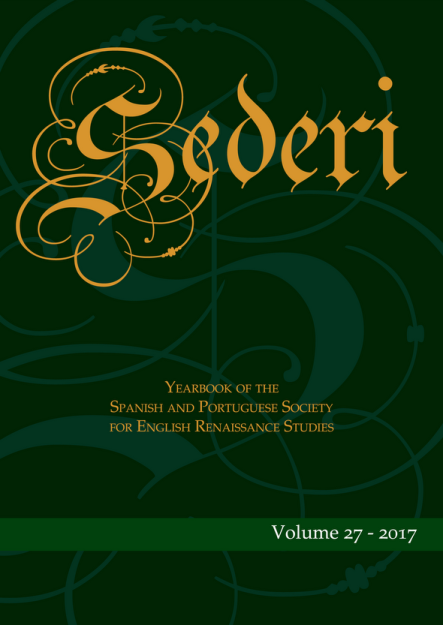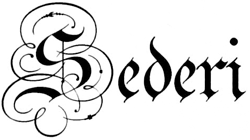
Sederi 27
Sederi 27 — 2017
EDITOR
Ana Sáez-Hidalgo
MANAGING EDITOR
Francisco J. Borge López
REVIEW EDITOR
María José Mora
ISSN 1135-7789
Víctor Huertas Martín, “Rupert Goold’s Macbeth (2010): Surveillance society and society of control.” SEDERI 27 (2017): 81–103.
DOI: https://doi.org/10.34136/sederi.2017.4 Download PDF
Abstract
This article deals with Rupert Goold’s film version of Macbeth (2010). Based on a stage production, this film is set in an unspecified Soviet country. I will analyze Goold’s creation of a stage-to-screen hybrid recording framed as a surveillance film. Relying on Michel Foucault’s and Gilles Deleuze’s works as well as various contributions made by Cultural Materialist and New Historicist critics, I intend to explore the power relations in this surveillance film. I will also examine how the surveillance film conventions deployed by Goold turn the narrative into a meta-filmic event. This allows the viewer to perceive surveillance as part of the subject matter of the story and as inseparable from its narrative structure. Eventually, this will serve to explore how surveillance entirely transforms the filmscape. What begins as a film set in a surveillance society ends up as an environment dominated by a society of control.
Keywords: Shakespeare on film; Macbeth; power relations; surveillance society; Foucault; Deleuze.
References
Ackroyd, Peter. 2006. Shakespeare (The Biography). London: Vintage.
Althusser, Louis. (1965) 2005. “Ideología y aparatos ideológicos del Estado (notas para una investigación).” In La filosofía como arma en la revolución, translated by Oscar Molina, 102–28. México: Siglo XXI.
Amis, Martin. 2003. Koba the Dread: Laughter and the Twenty Million. New York: Vintage International.
Archer, John Michael. 1993. Sovereignty and Intelligence (Spying and Court in the English Renaissance). Stanford: Stanford University Press
Bacon, Francis. 1999. “New Atlantis.” In Francis Bacon (Selected Philosophical Works), edited by Rosemary Sargent, 239–68. Indianapolis: Hackett Publishing Company.
Baudrillard, Jean. (1978) 2008. Cultura y simulacro, translated by Antoni Vicens and Pedro Rovira. Barcelona: Editorial Kairós.
Belsey, Catherine. 1992. “Literature, History, Politics.” In New Historicism and Renaissance Drama, edited by Richard Wilson and Richard Dutton, 33-44. London and New York: Longman.
Bourdieu, Pierre. 1999. Intelectuales, política y poder, translated by Alicia B. Gutiérrez. Buenos Aires: Eudeba Editorial Universitaria.
Conquest, Robert. 1986. The Harvest of Sorrow: Soviet Collectivization and the Terror-Famine. New York and Oxford: Oxford University Press.
Cooper, David, Marie-Odile Faye, Jean-Pierre Faye, Michel Foucault, and Marine Zecca. 2012. “Encierro, psiquiatría, prisión.” In Un diálogo sobre el poder y otras conversaciones, edited by Michel Foucault and translated by Miguel Morey, 124–68. Madrid: Alianza Editorial.
Davies, Anthony. (1989) 1991. Filming Shakespeare’s Plays (The Adaptations of Laurence Olivier, Orson Welles, Peter Brook and Akira Kurosawa). Cambridge: Cambridge University Press.
Deleuze, Gilles. 1987. Foucault, translated by José Vázquez Pérez. Barcelona: Editorial Paidós.
Deleuze, Gilles. 1990. “Control and Becoming: Gilles Deleuze in Conversation with Antonio Negri.” Translated by Martin Joughin. Futur Anterieur 1. Accessed September 2017. http://www.uib.no/sites/w3.uib.no/files/attachments/6._deleuze-control_and_becoming.pdf.
Deleuze, Gilles. 1992. “Postscript on the Societies of Control.” October 59: 3–7.
Deleyto, Celestino. 2003. Ángeles y demonios. Representación e ideología en el cine contemporáneo de Hollywood. Barcelona: Ediciones Paidós.
Derrida, Jacques. (1995) 2012. Espectros de Marx: el estado de la deuda, el trabajo del duelo y la nueva Internacional. Translated by José Miguel Alarcón and Cristina de Peretti. Madrid: Editorial Trotta.
Dickson, Andrew. 2016. “Rupert Goold: ‘It Was Pretty Intense, Living with My Lady Macbeth’.” The Guardian, July 17, 2016. Accessed September 2017. https://www.theguardian.com/stage/2016/jul/17/rupert-goold-macbeth-shakespeare.
Dollimore, Jonathan. 1989. Radical Tragedy: Religion, Ideology and Power in the Drama of Shakespeare and His Contemporaries. Hemel Hempstead: Prentice Hall, Harvester Wheatsheaf.
Dollimore, Jonathan. 1992. “Shakespeare, Cultural Materialism and the New Historicism.” In New Historicism and Renaissance Drama, edited by Richard Wilson and Richard Dutton, 45–56. London and New York: Longman.
Eagleton, Terry. 1986. William Shakespeare. Rereading Literature series. Oxford: Blackwell.
Elias, Norbert. 1982. The Civilizing Process. Vol. 2: Power and Civility. Translated by Edmund Jephcott. New York: Pantheon.
Foucault, Michael. (1975) 2012. Vigilar y castigar: el nacimiento de la prisión. Translated by Aurelio Garzón del Camino. Madrid: Editorial Biblioteca Nueva.
Fraser, Antonia. 1996. The Gunpowder Plot: Terror and Faith in 1605. London: Orion House.
Greenblatt, Stephen. 1994. “Invisible Bullets: Renaissance Authority and Its Subversion, Henry IV and Henry V.” In Political Shakespeare: Essays in Cultural Materialism, edited by Jonathan Dollimore and Alan Sinfield, 18–47. Manchester: Manchester University Press.
Greenblatt, Stephen. 2004. Will in the World: How Shakespeare Became Shakespeare. New York and London: W. W. Norton & Company.
Grossman, Vasily. Forever Flowing. Translated by Thomas P. Whitney. New York: Possev-Verlag, 1972.
Hamlet. 2009. Directed by Gregory Doran. Illuminations Media and BBC. DVD.
Hardt, Michael, and Antonio Negri. 2000. Empire. London: Harvard University Press.
Howard, Jean E. 1992. “The New Historicism in Renaissance Studies.” In New Historicism and Renaissance Drama, edited by Richard Wilson and Richard Dutton, 19–32. London and New York: Longman.
Hunt, Maurice. 2005. “Reformation/Counter-Reformation Macbeth.” English Studies 86 (5): 379–98.
Kammerer, Dietmar. 2004. “Video Surveillance in Hollywood Movies.” Surveillance & Society (CCTV Special) 2 (2/3): 464–73.
Kinney, Arthur F. 2008. “Macbeth’s Knowledge.” In Shakespeare Survey. Vol. 57: Macbeth and Its Afterlife, edited by Peter Holland, 11–26. Cambridge: Cambridge University Press.
Lefait, Sébastien. 2013. Surveillance on Screen: Monitoring Film and Television Programs. Lanham: Scarecrow Press.
Lefait, Sébastien. 2013–2014. “‘This same strict and most observant watch’ (1.1.71): Gregory Doran’s Hamlet as Surveillance Adaptation.” Borrowers and Lenders: The Journal of Shakespeare and Appropriation 8 (2). Accessed September 2017. http://www.borrowers.uga.edu/1072/pdf.
Levin, Thomas Y. 2002. “Rhetoric of the Temporal Index: Surveillant Narration and the Cinema of ‘Real Time’.” In CTRL [Space]: Rhetorics of Surveillance from Bentham to Big Brother, edited by Thomas Y. Levin et al., 578–93. Cambridge, Mass.: MIT Press.
Lyon, David. 2007. Surveillance Studies. An Overview. Cambridge: Polity.
Lyon, David. 2008. “Surveillance Society.” Paper presented at the Festival del Diritto, Piacenza, Italy, September 28, 2008.
Macbeth. 1948. Directed by Orson Welles. Mercury Productions. DVD.
Macbeth. 2010. Directed by Rupert Goold. Illuminations Media and BBC. DVD.
McGregor Wise, J. 2016. Surveillance and Film. New York and London: Bloomsbury Academic.
Nicholls, Mark. 1991. Investigating Gunpowder Plot. Manchester: Manchester University Press.
Orgel, Stephen. 2011. Spectacular Performances: Essays on Theatre, Imagery, Books and Selves in Early Modern England. Manchester: Manchester University Press.
Richards, Neil M. 2013. “The Dangers of Surveillance.” Harvard Law Review March 25: 1934-1965.
Said, Edward. 2003. Orientalism. London: Penguin Classics.
Schmitt, Carl. (1956) 2009. Hamlet or Hecuba: The Intrusion of the Time into the Play. Translated by David Pan and Jennifer Rust. New York: Telos Press.
Service, Robert. 2004. Stalin: A Biography. London: Macmillan.
Shakespeare, William. 2003. Macbeth. Edited by A. R. Braunmuller. Cambridge: Cambridge University Press.
Sinfield, Alan. 1992. “Macbeth: History, Ideology and Intellectuals.” In New Historicism and Renaissance Drama, edited by Richard Wilson and Richard Dutton, 167–80. London and New York: Longman.
Sokolova, Boika. 2013. “‘Horrible Imaginings’: Rupert Goold’s Film Adaptation, a Macbeth for the Twenty-First Century.” In Shakespeare on Screen: Macbeth, edited by Sarah Hatchuel, Nathalie-Guerrin, and Victoria Bladen, 149–69. Mont-Saint-Aignan: Presses Universitaires de Rouen et du Havre.
Stegh Camati, Anna. 2005. “Textual Appropriation: Totalitarian Violence in Shakespeare’s Macbeth and Tom Stoppard’s Cahoot’s Macbeth.” Ilha do Desterro 49: 339–67.
Stewart, Alan. 2003. The Cradle King: The Life of James VI and I, the First Monarch of a United Great Britain. New York: St. Martin’s Press.
“Theater Talk: Patrick Stewart, Rupert Goold on Macbeth.” April 2008, PBS. Video, 25:08. https://www.youtub.com/watch?v=DMyfSQQamIA .
Thomas, Alfred. 2014. Shakespeare, Dissent and the Cold War. Basingstoke: Palgrave Macmillan.
Williams, Raymond. 1977. Marxism and Literature. Oxford: Oxford University Press.
Wills, Garry. 1995. Witches and Jesuits. Oxford: Oxford University Press.
Wilson, Richard. 1992. “Introduction: Historicising New Historicism.” In New Historicism and Renaissance Drama, edited by Richard Wilson and Richard Dutton, 1–18. London and New York: Longman.
Wilson, Richard. 1993. Will Power: Essays on Shakespearean Authority. Detroit: Wayne State University Press.
Wilson, Richard. 2013. Free Will: Art and Power on Shakespeare’s Stage. Manchester and New York: Manchester University Press.
Wyver, John. 2010. “Macbeth with Sir Patrick Stewart: The Scottish Play from Stage to TV.” Bbctvblog, December 9, 2010. Accessed September, 2017. http://www.bbc.co.uk/blogs/tv/2010/12/macbeth-patrick-stewart-tv.shtml.
Wyver, John. 2016. Interview with author on June 21, 2016. Unpublished.
Zimmer, Catherine. 2015. Surveillance Cinema. New York and London: New York University Press.
